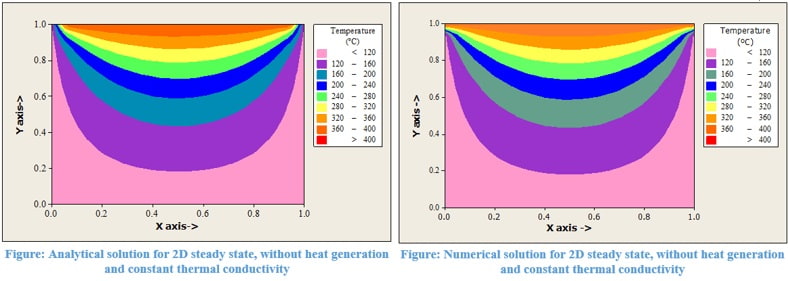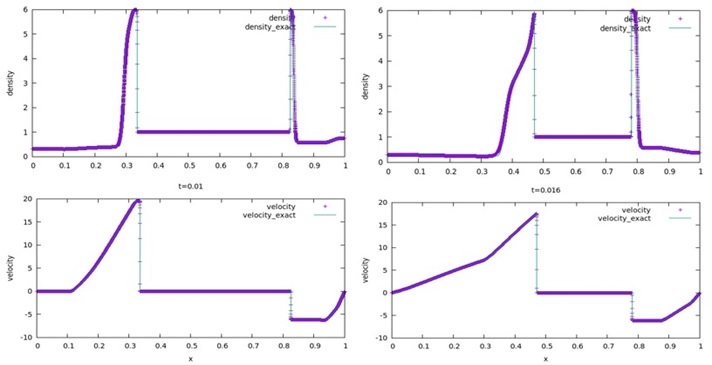The following projects are based on devc. This list shows the latest innovative projects which can be built by students to develop hands-on experience in areas related to/ using devc.

It is expensive to use physical experiments to get essential engineering data for designing is quite expensive. Getting engineering data of a fluid in motion, using Computational Fluid Dynamics (CFD) Simulations are relatively inexpensive. Costs are likely to be decreased as computational power has increased. So, using numerical methods to solve various flow problems is effective. In this project, you are going to solve a 1D Shock tube problem using Finite Volume Method.

All the engineering devices we use involves the conversion of energy. In this process, a lot of heat released to the surroundings as a part of energy loss. The efficiency of any device can be increased by minimizing loss due to heat transfer. That’s why a lot of research going on around the world in the field of heat transfer. To solve real-life heat transfer problems Numerical methods are preferred, because of less time consumption, ease, and convenience. To get hands-on experience on numerical methods, here you are going to solve the Two-Dimensional flat plate problem with Constant conductivity heat transfer by using Numerical methods.

To run an organization smoothly and to keep a record of all data in a systematic manner we require a computerized management system. A computerized management system helps in storing, retrieving and modifying data more efficiently. So, in this project, you are going to address one of these kinds of a problem by developing a software for banking management system using C++ and Oracle 11g.

Analytical solutions give exact solutions that can be used to study the behavior of the system with varying properties. Unfortunately, very few practical systems lead to analytical solutions, and again the use of analytical solutions is of limited use because of its difficulty. That’s why we use a numerical approach to make a close answer to practical result with ease and convenience. Recently there is a lot of research going on in this field. Doing a project in this field will give you an advantage over others. In this project, you are going to write your own code to solve a one-dimensional nozzle problem using numerical approach and you have to find out the properties of fluid flowing through the nozzle along its length.

A large organization uses a huge amount of data every day. Again with time the amount of data keeps on increasing. Keeping a record of those data using pen and paper is not advisable as physical data can be misplaced and difficult to retrieve. So, to run an organization smoothly and to keep a record of all data in a meaning full manner, we require a computerized management system. In this project, you will be addressing one of this kind of problem, which is the management of a library by developing an application using C++ and Oracle 11g.
Want to develop practical skills on latest technologies? Checkout our latest projects and start learning for free

Numerical analysis is one of the most researched fields today. Getting an exact solution for physical problems is too difficult and again for most of the physical problems exact solution does not exist at all, so numerical techniques are preferred to obtain a fairly exact solution with ease. In this project, you will write your own codes to simulate temperature distribution over a 1D flat plate and compare its result with the exact solution to check the accuracy of your Numerical solution.

Numerical analysis is one of the most researched fields today. Getting an exact solution for physical problems is too difficult and again for most of the physical problems exact solution does not exist at all, so numerical techniques are preferred to obtain a fairly exact solution with ease. In this project, you will write your own codes to simulate temperature distribution over a 1D flat plate and compare its result with the exact solution to check the accuracy of your Numerical solution.

There are mainly three different ways of heat transfer, Heat transfer by conduction, convection, and radiation. Conductive heat transfer is the basic mode of heat transfer, and it is comparatively easy to understand. In this project, you are going to solve a 2D conductive heat transfer problem involving variable conductivity. You will use numerical methods to solve this problem.

It is expensive to use physical experiments to get essential engineering data for designing is quite expensive. Getting engineering data of a fluid in motion, using Computational Fluid Dynamics (CFD) Simulations are relatively inexpensive. Costs are likely to be decreased as computational power has increased. So, using numerical methods to solve various flow problems is effective. In this project, you are going to solve a one-dimensional problem of interacting blast waves using the Finite Volume Method (FVM).

Turbulent flows have an infinite variety ranging from the flow of blood in our body to the atmospheric flows. Everyday life gives us an intuitive knowledge of turbulence in fluids; during air travel, one often hears the word turbulence generally associated with the fastening of seat-belts. The flow passing an obstacle or an airfoil creates turbulence in the boundary layer and develops a turbulent wake which will generally increase the drag exerted by the flow on the obstacle. The majority of atmospheric or oceanic currents cannot be predicted accurately and fall into the category of turbulent flows, even in the large planetary scales. Galaxies look strikingly like the eddies which are observed in turbulent flows such as the mixing layer, and are, in a way of speaking, the eddies of a turbulent universe. Numerous other examples of turbulent flows arise in aeronautics, hydraulics, nuclear and chemical engineering, oceanography, meteorology, astrophysics, and internal geophysics. A clear understanding of this physical phenomena is one of the most essential and important problems of applied science.
Want to develop practical skills on latest technologies? Checkout our latest projects and start learning for free
Join 250,000+ students from 36+ countries & develop practical skills by building projects
Get kits shipped in 24 hours. Build using online tutorials.
Stay up-to-date and build projects on latest technologies